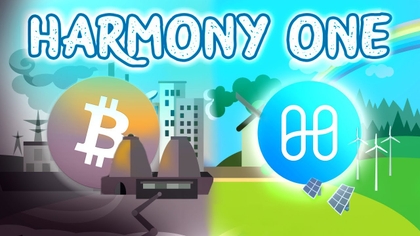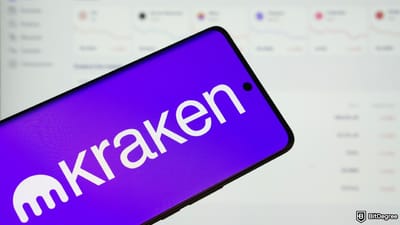Key Takeaways
- Blockchain's core strengths - decentralization, immutability, and security - can revolutionize industries with secure and transparent applications.
- Widespread adoption requires overcoming user education, regulations, and scalability.
- Building a successful blockchain future requires collaboration across all stakeholders, including experts, companies, and governments.
Stop overpaying - start transferring money with Ogvio. Sign up, invite friends & grab Rewards now! 🎁
Imagine a world where every transaction you make is secure, transparent, and cuts out the middleman in seconds. Sounds pretty futuristic, right? Well, that's exactly what the future of blockchain technology promises. Sure, it's the backbone of cryptocurrencies like Bitcoin, but its potential stretches far beyond just digital money. We're talking about streamlining financial transactions, tracking goods across continents in real time, and even securing your identity like never before.
So, what is the future of blockchain? Buckle up, because there are some potential exciting developments on the horizon. In this article, I will show you how blockchain can revolutionize industries like finance, supply chain management, and even voting. We'll also explore challenges like scalability and security, and how they're being addressed.
But is blockchain the future? It's certainly shaping up that way. Major companies are taking notice, and billions of dollars are being poured into blockchain development. Even popular cryptocurrency exchanges like Binance, Bybit, and Kraken are constantly innovating in this space. One thing's for sure: the future of blockchain is bright, and we're here to explore exactly what that means.

Did you know?
Subscribe - We publish new crypto explainer videos every week!
Non-custodial Wallet: Why Do You Need It Right NOW


Table of Contents
- 1. Key Trends Shaping the Future of Blockchain
- 1.1. Scalability and Efficiency
- 1.2. Security and Regulation
- 1.3. Interoperability and Collaboration
- 1.4. Sustainability and Environmental Impact
- 2. The Impact of Blockchain on Specific Industries
- 2.1. Finance and Banking
- 2.2. Supply Chain Management
- 2.3. Identity Management
- 2.4. Voting and Governance
- 3. Challenges and Risks of Blockchain Adoption
- 3.1. Challenges of User Adoption
- 3.2. Market Volatility and Security Risks
- 3.3. Lack of Standardized Regulations
- 4. Conclusion
Key Trends Shaping the Future of Blockchain
The first step in discovering the future of blockchain is examining the current trends that may shape that horizon. The question remains: what trends will shape the future of blockchain? Let's dive into some critical areas of development that will determine how this technology scales and matures in the coming years.
Latest Deal Active Right Now:Scalability and Efficiency
Picture a superhighway designed for the future of blockchain, buzzing with secure transactions. But what if rush hour hits, and everything grinds to a halt? That's the challenge of scalability - making sure blockchain technology can handle the massive amount of traffic it might encounter in the future.
Right now, some blockchain networks can be a bit slow. Transactions can take a while to process, which isn't exactly ideal for a future built on speed and efficiency. This is a hurdle that needs to be addressed for the future of blockchain technology to truly thrive.
So, what are some solutions being explored? Here's a quick breakdown:
- Sharding: Think of sharding as dividing the highway into multiple lanes. This allows for parallel processing of transactions, speeding things up significantly. A real-life example of sharding in action is Ethereum 2.0, which is currently under development and plans to implement sharding to significantly increase its transaction processing capacity.

- Layer-2 solutions: Think of an express lane built on top of the existing highway. These solutions handle transactions off the main blockchain, and then settle them later, reducing congestion on the main network. A recent development in Layer-2 solutions is the growing popularity of Optimism and Arbitrum, which are scaling protocols built on top of the Ethereum blockchain. These protocols are already seeing a surge in usage, demonstrating the potential of Layer-2 solutions for the future of blockchain.
These are just a few ideas on the table. Developers are constantly innovating, and the future of blockchain looks bright when it comes to scalability. By tackling these challenges, we can ensure smooth sailing on the blockchain highway in the years to come.
Security and Regulation
Even the most futuristic highway needs security measures, and blockchain is no different. While it boasts a pretty impressive security track record, there are always risks to consider. Let's talk about some potential threats and how the future of blockchain is addressing them.
Security Concerns:
- Hacking: Blockchains are secure, but remember, they're still technology, and technology can be vulnerable. Hackers are constantly looking for weaknesses, so staying ahead of the curve is crucial.
- Smart contract vulnerabilities: These are basically self-executing programs on the blockchain. A bug in the code could lead to unintended consequences, like stolen funds.

Building a Stronger Future:
- Security audits: Just like getting your car checked before a road trip, regular security audits are becoming standard practice for blockchain projects. This helps identify and patch vulnerabilities before they can be exploited.
- Formal verification: This involves using advanced math to mathematically prove the security of a blockchain system. It's like having an extra layer of security insurance for the future of blockchain.
Regulation on the Rise:
The blockchain future is also attracting the attention of regulators. This isn't necessarily a bad thing. Clear regulations can actually create a more stable and trustworthy environment for everyone involved. Here are some recent developments:
- Global collaboration: International organizations like the Financial Stability Board (FSB) are working on creating a framework for regulating crypto-assets. This global approach aims to ensure consistency and prevent regulatory arbitrage.

- Sandbox programs: Some countries, like Singapore, are setting up "sandbox" programs where blockchain companies can experiment with new technologies in a controlled environment. This allows for innovation while mitigating risks.
The future of blockchain technology is being built with security and regulation in mind. By addressing potential threats and fostering a collaborative environment, we can ensure a safe and prosperous journey on the blockchain highway.
Interoperability and Collaboration
Remember that vision of the future of blockchain with a superhighway buzzing with secure transactions? Now imagine each lane being operated by a different company, all with their own rules and systems. Not exactly efficient for a cross-country trip, is it? That's the challenge of interoperability – different blockchains working in isolation, hindering the potential for collaboration in the future of blockchain technology.
The good news? Just like countries coming together to create a more unified world, the blockchain future is seeing a push for interoperability.
A recent development in this space is Cosmos, a project aiming to create an "internet of blockchains". Cosmos uses a network of interconnected blockchains called "zones", each potentially with its own unique features. However, thanks to the Cosmos Hub, these zones can communicate and exchange data with each other. This creates a modular and scalable blockchain ecosystem, paving the way for a more collaborative future.

By fostering collaboration and breaking down barriers, interoperability is key to unlocking the true potential of blockchain technology. This will allow us to have a future where supply chain data flows seamlessly across different platforms, or where financial transactions can happen across borders with ease. The possibilities are exciting, and interoperability is paving the way for a more connected and collaborative blockchain future.
Sustainability and Environmental Impact
We've talked about security, collaboration, and making the future of blockchain a smooth ride. But what about the environment? Is blockchain the future, or is it a gas-guzzling monster polluting the digital landscape?
Let's be honest, some blockchain technologies can be energy-hungry. The way some systems verify transactions requires a lot of computing power, which can translate to a hefty carbon footprint. This is a concern, and it's something that needs to be addressed for a truly sustainable future of blockchain.

Fortunately, there are solutions emerging. One of them is the Proof-of-Stake (PoS) model. Imagine a more energy-efficient way to verify transactions. PoS is a system that uses less power compared to traditional methods, making it a greener alternative for the future of blockchain technology.
The blockchain future is all about innovation, and finding sustainable solutions is a key part of the journey. By adopting greener protocols and promoting responsible development, we can ensure a blockchain future that's not just secure and efficient, but environmentally conscious as well.
The Impact of Blockchain on Specific Industries
Now that we've explored the recent trends in the blockchain landscape, it's time to see where it's headed! Buckle up, because we're about to dive into specific industries that are poised to be transformed by the future of blockchain technology.
From finance to supply chains, get ready to see how blockchain can revolutionize the way we do business.

Did you know?
Subscribe - We publish new crypto explainer videos every week!
Harmony ONE Explained (Beginner-Friendly Animation)


Finance and Banking
I think it is safe to say that we would love to live in a world where international payments blast across borders in seconds, leaving those hefty fees and middleman roadblocks in the dust. That's the kind of financial revolution blockchain technology promises.
Traditionally, financial transactions can be slow, complex, and riddled with paperwork. However, blockchain technology has the potential to streamline the process significantly. Here's how:
- Faster and cheaper transactions: Blockchain can cut out the need for intermediaries like banks, reducing transaction times and fees. Future blockchain developments may allow us to send money overseas in minutes instead of days!

- Enhanced security: Blockchain's tamper-proof nature makes it highly secure for financial transactions. This reduces the risk of fraud and errors, giving everyone peace of mind.
- Increased transparency: All transactions on a blockchain are recorded publicly and immutably. This fosters transparency and accountability within the financial system.
This isn't just science fiction. Major players like BlackRock, along with cryptocurrency exchanges like Binance, Bybit, and Kraken, are already investing heavily in blockchain technology. They see the potential to disrupt the traditional financial landscape and create a more efficient, secure, and accessible system for everyone.
The future of blockchain in finance isn't just about faster transactions. It's about opening up new possibilities. Here are two of the most popular blockchain developments in the financial industry:
- Decentralized Finance (DeFi): DeFi is a new breed of financial services built on blockchain, offering everything from loans to investments without the need for traditional banks.
- Tokenized assets: Tokenization allows real-world assets like stocks and bonds to be represented on a blockchain, making them easier to trade and manage.

The future of blockchain is poised to revolutionize the world of finance, making it faster, cheaper, and more accessible for everyone. Whether you're a seasoned investor or just starting out, the blockchain future holds exciting possibilities for managing your finances.
Supply Chain Management
Imagine a world where you can trace the origin of your morning coffee bean, all the way from farm to cup, with just a few clicks. Sounds pretty futuristic, right? Well, the future of blockchain technology is making this a reality for supply chains across industries.
Our current supply chains can be opaque and inefficient. It's often difficult to track the journey of a product, leaving room for errors, counterfeiting, and even foodborne illness outbreaks. But blockchain technology can be a game-changer. Here's how:
- Enhanced transparency: Every step of a product's journey can be recorded on a blockchain, providing a tamper-proof record for everyone involved. This allows consumers to see exactly where their products come from, from harvest to store shelf.
- Improved efficiency: Blockchain can streamline communication and data sharing between different players in the supply chain. This reduces delays and paperwork, ultimately getting products to market faster.
- Reduced fraud: The secure nature of blockchain makes it difficult to counterfeit products or tamper with data. This fosters trust and strengthens brand reputation.

The future of blockchain in supply chain management is already being demonstrated by real-life examples. For instance, Walmart's Food Safety Collaboration Center uses blockchain technology[1] to track mangoes from farms to store shelves.
This allows for faster identification and removal of contaminated products, improving food safety for consumers. The future of blockchain in supply chain management is bright. This newfound transparency and efficiency can benefit everyone involved, from producers and distributors to consumers like you and me.
Identity Management
Ever feel like you're drowning in a sea of usernames, passwords, and security questions? You're not alone. Traditional identity management systems can be cumbersome and sometimes vulnerable to breaches.
But fret no more, because the future of blockchain technology offers a glimmer of hope. Proper integration of blockchain in the identity management sector may allow you to have complete control over your digital identity, carrying it securely in your pocket (or rather, your digital wallet).

Our current identity management systems rely on centralized servers, which can be hacked or compromised. Blockchain offers a solution with:
- Self-Sovereign Identity (SSI): In the future of blockchain, you could hold your own digital identity on a blockchain. This SSI would be like a secure passport, containing all your verified information. You'd have complete control over what information you share with different entities.
- Enhanced security: Blockchain's tamper-proof nature makes it extremely secure for storing identity data. This reduces the risk of identity theft and fraud.
- Improved privacy: With SSI, you choose what information you share. This puts you back in control of your digital footprint in the future of blockchain technology.
The potential applications of blockchain for identity management are vast. Here are a few real-life examples already making waves:
- Estonia: This tech-savvy country has been a pioneer in using blockchain for e-government services. Their residents can use blockchain-based digital IDs to access everything from healthcare records to online voting.

- Civic: This non-profit organization is developing a blockchain platform for secure identity management. They're working with governments and businesses to create a future where individuals have a secure and portable digital identity.
The future of blockchain in identity management holds immense promise. Picture a future where you can use your SSI to seamlessly access various services, from healthcare to travel, without worrying about data breaches or identity theft. By empowering individuals with control over their data, blockchain technology has the potential to revolutionize the way we navigate the digital world.
Voting and Governance
Elections and governance are complex topics requiring a constant collaboration of numerous parties. Now picture a situation where secure and transparent voting happens online, without any risk of manipulation. Blockchain technology has the potential to make this a reality.
Here's the idea: votes would be recorded on a blockchain, a secure and decentralized ledger. This means everyone can see the votes, but no one can change them. This could revolutionize elections, increasing trust and participation.

But voting is just one piece of the puzzle. Blockchain could also be used to create new forms of governance in the future. Decentralized Autonomous Organizations (DAOs) are a prime example. DAOs are essentially communities run by code and voting on the blockchain.
Of course, the future of blockchain isn't all sunshine and rainbows. There are challenges to address, like the issues of acceptability and the need for new governance models[2]. But with continued development, blockchain has the potential to transform how we vote, govern, and collaborate.
Challenges and Risks of Blockchain Adoption
We've explored the exciting possibilities that blockchain technology holds across different industries. It's tempting to ask, is blockchain the future? While the potential is undeniable, there are challenges and risks to consider before widespread adoption becomes a reality.
Let's delve into some of these hurdles to get a well-rounded picture of the future of blockchain technology.
Challenges of User Adoption
Even with all the buzz, there are roadblocks on the road to a blockchain future. One major hurdle is user adoption. For the average person, blockchain technology can feel complex and intimidating. Imagine explaining the intricacies of cryptography to your grandma! Simplifying user interfaces and building user-friendly applications will be crucial for widespread adoption.
Another challenge is a lack of awareness. Many people still don't understand what blockchain is, let alone its potential applications. Educating the public about the benefits and functionalities of blockchain will be essential for building trust and getting people on board.

Finally, established institutions might resist the shift towards a blockchain future. Think big banks, traditional supply chain operators, or even governments. These players already have entrenched systems and regulations, and embracing new technology can be disruptive and pose a threat to their current power structures. Overcoming this resistance will require collaboration and finding ways to integrate blockchain technology into existing systems, rather than replacing them entirely.
To bridge this knowledge gap, innovative educational platforms are emerging. One great example is a gamified platform like BitDegree, where users can learn about blockchain and Web3 concepts through interactive courses and Missions. Earning rewards while mastering the intricacies of smart contracts or decentralized applications could be a game-changer for user engagement.

By making learning about blockchain fun and accessible, platforms like BitDegree can empower individuals to participate in the future of blockchain technology, not just be passive observers.
So, what is the future of blockchain? It's a future built on education, user-friendliness, and collaboration. By addressing these challenges, we can unlock the true potential of blockchain technology and usher in a new era of innovation across various industries.
Market Volatility and Security Risks
Another major risk lies in cryptocurrency scams. Just like any new technology, bad actors emerge looking to exploit unsuspecting users. Phishing attacks, fake Initial Coin Offerings (ICOs), and pyramid schemes can all leverage the complexity of blockchain to steal funds. Education and responsible platform development are crucial to mitigating these risks in the future of blockchain.
Another concern is the inherent volatility of cryptocurrency markets. The value of digital assets can fluctuate wildly, leading to significant financial losses for investors. While strong fundamentals and real-world use cases can help stabilize markets in the long run, short-term volatility remains a risk for those entering the space.

Finally, security breaches are a constant threat in the digital world, and blockchain is no exception. Hackers are constantly looking for vulnerabilities in exchanges and wallets to steal cryptocurrency. Investing in robust security measures and promoting responsible practices like secure password management will be essential to safeguarding user assets in the blockchain future.
By acknowledging these risks and taking proactive steps to mitigate them, we can build a more secure and trustworthy foundation for the future of blockchain technology.

- Secure and reliable
- Accepts fiat currencies
- Lots of trading options
- Reputable exchange
- Accepts fiat currencies
- Offers various trading options

- Huge trading variety
- Regulation-compliant around the globe
- Fair trading fees
- Beginner-friendly
- A wide array of features
- Vast number of different crypto coins & tokens

- Beginner-friendly
- Secure
- Decent trading and withdrawal fees
- Crypto.com Visa Card
- Automated tools & bots
- Ecosystem synergy with CRO
Lack of Standardized Regulations
Imagine navigating a highway system where every exit has different traffic rules! That's kind of what the future of blockchain looks like right now when it comes to regulations. There's a lack of standardized regulations across different countries, which throws a wrench into widespread adoption.
For businesses, this uncertainty can be a real buzzkill. How can they invest in technology when the rules of the road keep changing? Without clear regulations, businesses are hesitant to jump in for fear of non-compliance or unexpected legal roadblocks.

This lack of standardization also hinders innovation in the future of blockchain. Developers might be hesitant to create groundbreaking applications if they're unsure how those applications will be regulated in different markets.
So, what's the solution? Collaboration is key. Governments and regulatory bodies around the world need to work together to establish a clear and consistent framework for blockchain technology. This will provide businesses with the certainty they need to invest and developers with the freedom to innovate, ultimately paving the way for a more robust and thriving blockchain future.
Conclusion
We've explored the vast potential of blockchain technology, from revolutionizing financial transactions on platforms like Binance, Bybit, and Kraken to creating secure and transparent voting systems. We've also examined a future of blockchain where we can track how food travels from farm to table with complete transparency, personal data is securely stored and controlled by individuals, and tamper-proof voting systems strengthen democratic processes.
Its core functionalities - decentralization, immutability, and security - open doors for innovation across a wide range of industries.
But is blockchain the future? While the potential is undeniable, challenges and risks need to be addressed. Educating users, fostering collaboration between institutions, and establishing clear regulations will be crucial for responsible and ethical development in the future of blockchain technology.
The future of blockchain is not set in stone. By proactively harnessing its potential, we can unlock a future where blockchain technology empowers individuals, transforms industries, and fosters a more secure and transparent society. The journey towards a blockchain future has only just begun, and the possibilities are truly limitless.
The content published on this website is not aimed to give any kind of financial, investment, trading, or any other form of advice. BitDegree.org does not endorse or suggest you to buy, sell or hold any kind of cryptocurrency. Before making financial investment decisions, do consult your financial advisor.
Scientific References
1. Sharma M., Kumar P.: 'Adoption of Blockchain Technology: A Case Study of Walmart';
2. Batubara F. R., Ubacht J., Janssen M.: 'Challenges of Blockchain Technology Adoption for E-government: A Systematic Literature Review'.









